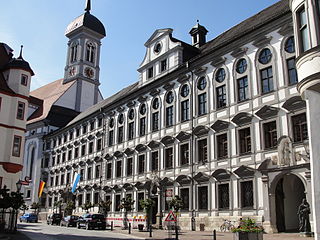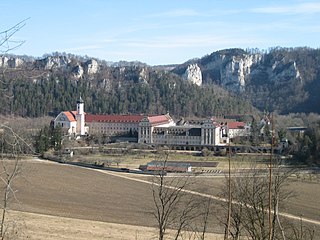
Auerbach in der Oberpfalz is a town in the Amberg-Sulzbach district, Bavaria, Germany. It is located 45 km northeast of Nuremberg. In the subdivision Michelfeld there was a Benedictine monastery which is now a nursing home.

Jacob Anton Zallinger zum Thurn was a philosopher and canonist.
Gregor Zallwein was an Austrian expert on canon law.
Johann Georg Reiffenstuel (1641–1703) was a Canon law expert.
Paul Laymann was an Austrian Jesuit and moralist.

Johann Michael Sailer was a German Jesuit theologian and philosopher, and Bishop of Regensburg. Sailer was a major contributor to the Catholic Enlightenment.
Herman Scholliner was a German Benedictine theologian and historian.
Dominic Schram, sometimes spelled Schramm was a German Benedictine theologian and canonist.
Vitus Pichler was an Austrian Jesuit canonist and controversial writer.
Francis Xavier Schmalzgrueber was a German Jesuit canonist.
Matthieu Petit-Didier was a French Benedictine theologian and ecclesiastical historian.
Benedict Stattler was a German Jesuit theologian, and an opponent of Immanuel Kant. He was a member of the German Catholic Enlightenment.

Peter Nigri, known also as Peter George Niger, was a Dominican theologian, preacher and controversialist.

The University of Dillingen, at Dillingen an der Donau in southern Germany, existed from 1551 to 1803. It was located in Swabia, then a district of Bavaria.

Frobenius Forster was a German Benedictine, Prince-Abbot of St. Emmeram.
Laurenz Forer was a Swiss Jesuit theologian and controversialist.
Marian Dobmayer was a German Benedictine theologian.

Maurus Wolter was the first abbot of the Benedictine Beuron Archabbey, which he founded with his brother Placidus in 1863.
Edward Neal Peters is an American Roman Catholic canonist and serves as a referendary of the Apostolic Signatura. In 2023, he is professor of canon law at the Sacred Heart Major Seminary of the Archdiocese of Detroit.
Heinrich Suso Mayer OSB, usually called just Suso Mayer, né Franz Mayer, was a German Benedictine and priest.







